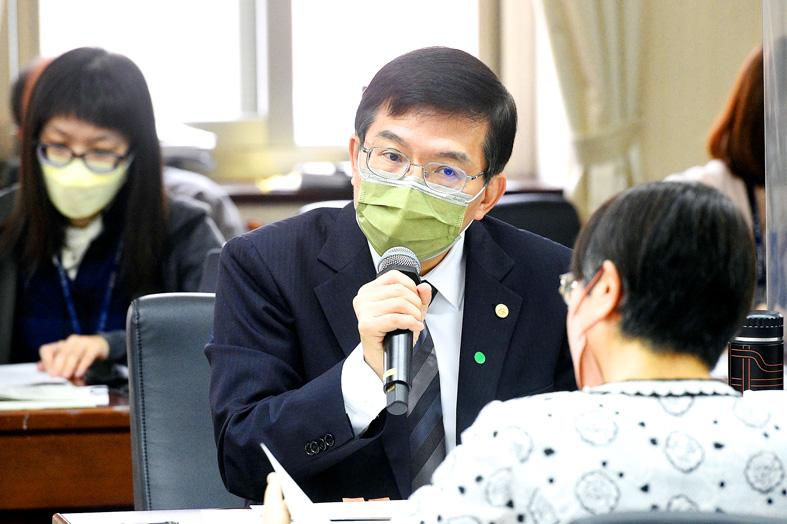The legislature’s Transportation Committee yesterday voted nine to five to grant preliminary approval to a draft statute establishing a state-run Taiwan Railway Corp.
The government is proposing transitioning the Taiwan Railways Administration (TRA) from an agency to a state-run corporation after major express train derailments in 2018 and last year exposed structural problems within the agency that have compromised safety.
The committee considered a version of the draft statute proposed by the Taiwan Railway Labor Union, the largest union in the agency, in addition to the government’s draft. The committee agreed to 16 of the 23 articles in the union’s proposal following a four-hour deliberation yesterday morning.

Photo: George Tsorng, Taipei Times
The seven remaining articles are to be settled through negotiations with opposition lawmakers, after which the statute is to be put to a final vote at a plenary session.
Those articles involve clearing the TRA’s short-term debts, protecting employee benefits and securing funding for early retirement packages.
Opposition lawmakers tried to stop committee deliberations through a series of procedural questions. When that failed, they tried to halt a final vote at the plenary session.
Chinese Nationalist Party (KMT) Legislator Chen Hsueh-sheng (陳雪生) said the committee should give the Ministry of Transportation and Communications more time to negotiate unresolved articles with the union so that the committee could submit a draft statute unopposed by the union to the plenary session for final approval, Chen said.
Lawmakers also proposed five motions to change the wording in some of the articles, KMT Legislator Hung Meng-kai (洪孟楷) said.
“Must the Democratic Progressive Party (DPP) insist on moving the draft statute out of the committee given all the unsettled issues?” Hung asked.
The ministry should consolidate different proposals, and the committee should schedule another meeting to review these remaining articles, he said.
DPP Legislator Lin Chun-hsien (林俊憲), who presided over yesterday’s committee meeting, put the bill to a vote to break the legislative gridlock.
Of the 14 legislators who appeared at the committee, nine voted to grant preliminary approval to the draft statute.
Wang told the committee that the ministry had in 2003 attempted to negotiate with the union about corporatizing the TRA.
“It is almost impossible to reach a consensus with the union, which has 15 branches across the country,” he said, adding that the TRA has two other unions to negotiate with.
The ministry said that it would meet the union’s demand to establish a budget to resolve the TRA’s short-term debts. The revenues are to come from TRA property revenues and government budgets, among other sources.
Leasing TRA properties would only pay for the interest on the debts, Wang said.
The ministry also agreed to highlight operational safety in Article 2 of the draft statute, which states that the railway operator should thoroughly follow regulations to ensure safe train operation.
Separately, Wang said that the ministry would announce a plan today to handle travelers on International Workers’ Day long weekend, adding it would use high-speed rail trains as well as freeway, highway, city and tour buses.
“We will ask people not to take TRA trains if the workers insist on taking May 1 off. We will also ensure that trains operating on that day are safe to take,” he said.
About 12,000 TRA workers said they would not work on May 1, including 90 percent of train drivers, the TRA said.

Taiwan is stepping up plans to create self-sufficient supply chains for combat drones and increase foreign orders from the US to counter China’s numerical superiority, a defense official said on Saturday. Commenting on condition of anonymity, the official said the nation’s armed forces are in agreement with US Admiral Samuel Paparo’s assessment that Taiwan’s military must be prepared to turn the nation’s waters into a “hellscape” for the Chinese People’s Liberation Army (PLA). Paparo, the commander of the US Indo-Pacific Command, reiterated the concept during a Congressional hearing in Washington on Wednesday. He first coined the term in a security conference last

Prosecutors today declined to say who was questioned regarding alleged forgery on petitions to recall Democratic Progressive Party (DPP) legislators, after Chinese-language media earlier reported that members of the Chinese Nationalist Party (KMT) Youth League were brought in for questioning. The Ministry of Justice Investigation Bureau confirmed that two people had been questioned, but did not disclose any further information about the ongoing investigation. KMT Youth League members Lee Hsiao-liang (李孝亮) and Liu Szu-yin (劉思吟) — who are leading the effort to recall DPP caucus chief executive Rosalia Wu (吳思瑤) and Legislator Wu Pei-yi (吳沛憶) — both posted on Facebook saying: “I

The Ministry of Economic Affairs has fined Taobao NT$1.2 million (US$36,912) for advertisements that exceed its approved business scope, requiring the Chinese e-commerce platform to make corrections in the first half of this year or its license may be revoked. Lawmakers have called for stricter enforcement of Chinese e-commerce platforms and measures to prevent China from laundering its goods through Taiwan in response to US President Donald Trump’s heavy tariffs on China. The Legislative Yuan’s Finance Committee met today to discuss policies to prevent China from dumping goods in Taiwan, inviting government agencies to report. Democratic Progressive Party Legislator Kuo Kuo-wen (郭國文) said

The Ministry of Economic Affairs has fined Taobao NT$1.2 million (US$36,900) for advertisements that exceeded its approved business scope and ordered the Chinese e-commerce platform to make corrections in the first half of this year or its license would be revoked. Lawmakers have called for stricter supervision of Chinese e-commerce platforms and more stringent measures to prevent China from laundering its goods through Taiwan as US President Donald Trump’s administration cracks down on origin laundering. The legislature’s Finance Committee yesterday met to discuss policies to prevent China from dumping goods in Taiwan, inviting government agencies to report on the matter. Democratic Progressive Party